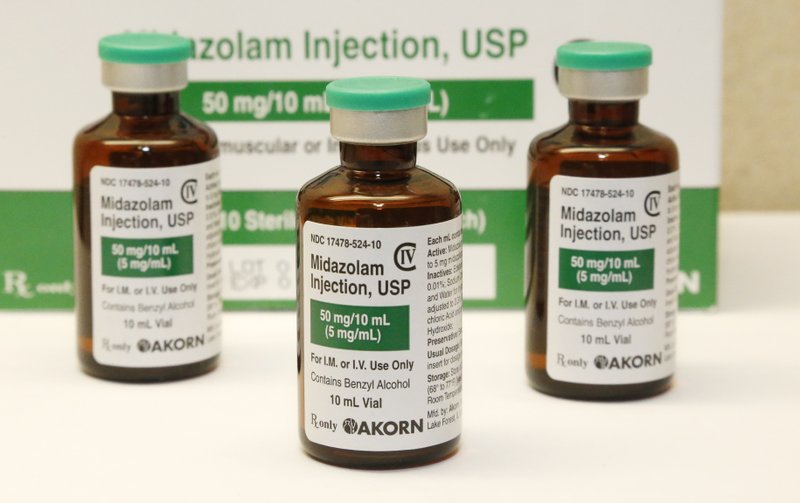The Arkansas attorney general's office began putting witnesses on the stand Monday in the federal trial over the state's lethal-injection drugs, starting with two experts who expressed little doubt that the first drug used in executions is effective at blocking the pain caused by later injections.
The testimony of Dr. Daniel Buffington, a pharmacologist and professor at the University of South Florida, and Dr. Joseph Antognini, an anesthesiologist at the University of California-Davis, largely countered assertions made by other expert witnesses called by attorneys for 18 Arkansas death-row inmates during the first week of the trial.
The inmates, through their attorneys present at the nonjury trial, have contended that midazolam -- the first of three drugs used in Arkansas executions -- is not effective at rendering them unconscious, thus causing excruciating pain. The inmates contend the state protocol violates their Eighth Amendment right to be free from cruel and unusual punishment.
Midazolam is followed by vecuronium bromide -- a paralytic that renders an inmate unable to breathe -- and potassium chloride, a heart-stopping drug that is described as causing a "burning" sensation.
Antognini, who said he has worked with thousands of patients, described midazolam as an effective sedative, albeit one that has fallen out of favor in clinical settings in place of more recently developed drugs.
"If we were on an island, and [midazolam] was all I had ... that's what I would give you," Antognini said.
State law dictates what drugs are to be used in executions, but attorneys for the inmates have proposed supposedly less painful alternatives, namely the firing squad.
Throughout Monday's all-day testimony, the inmates' attorneys challenged the conclusions of the state's experts by calling up numerous studies, reports and guidelines that were cited in the experts' written briefs to the court.
In one instance, attorney Will Freeman projected a copy of package instructions for midazolam, showing that Antognini, when quoting the document, had used ellipses to skip over sections that stated the drug should be used along with other drugs for general anesthesia.
Antognini responded that the U.S. Food and Drug Administration has approved midazolam as a general anesthetic.
Both Antognini and Buffington, the pharmacologist, suggested that testimony from the inmates' experts about a "ceiling effect" of the drug -- referring to a point at which larger doses no longer become effective -- were based on speculation, rather than evidence.
The ceiling effect of midazolam, Buffington said, "is simply a theoretical discussion."
"How can you have a consensus on something that has never been proven?" he responded when questioned by an attorney for the inmates. That attorney pointed to last week's testimony of an anesthesiologist testifying for the inmates, Dr. Gail Van Norman of the University of Washington, who had stated "there is a very strong consensus" within the medical community on the ceiling effect.
It will be up to U.S. District Judge Kristine Baker to unravel the dueling testimonies and issue a decision on the legality of the drugs once testimony wraps up later this week.
Two years ago, Baker issued a preliminary injunction in the same case that temporarily halted the state's plans for eight lethal injections in April 2017. Baker's order was overturned, however, by the 8th U.S. Circuit Court of Appeals in St. Louis. Four of those executions were later carried out.
The case, meanwhile, remained in Baker's court while attorneys prepared their arguments for trial.
That trial will continue at 9 a.m. today in Baker's court.
Metro on 04/30/2019
